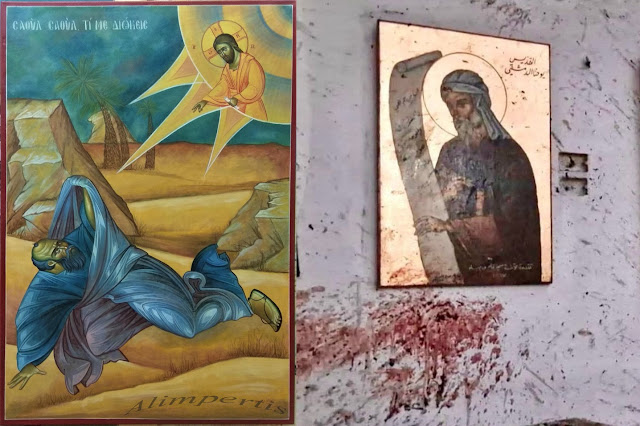By Fr. Panagiotis Kapodistrias
Damascus remains a heavy place, charged from all sides: socially, politically, religiously, militarily, etc. Centuries ago, it was there that Saul, a fervent Jew and persecutor of Christians, traveled “bearing letters to the synagogues” (Acts 9:2), determined to bring the disciples of Jesus bound to Jerusalem. He had zeal, determination, and religious self-confidence. He believed he was serving God...
In that same city, just a few days ago (June 22, 2025), a man strapped with explosives entered the Orthodox Church of the Prophet Elias. The act of this suicide bomber provoked horror and mourning. His entrance into the church was an act of violence and murder, without dialogue or confrontation.
Saul, shortly before reaching his destination, was enveloped in light and heard a voice: “Saul, Saul, why are you persecuting me?” (Acts 9:4). He received a word from above, a word that knew his identity and cared enough to redirect his path. He became blind, fell silent, and was led to conversion.
The 2025 bomber, who reached the same city and caused devastation, walked in silence—without a word, without contact... The swiftness of his act closed every channel or possibility for connection. No glance, no voice, no dialogue... Only blood everywhere...
The Church remembers Paul as the Great Apostle, but also as a man who was transformed thanks to a personal calling he received—indeed, a calling by name. John Chrysostom notes that Christ does not address crowds, but persons; the “Saul, Saul” reveals God's personal care and the value even of the one who persecutes (PG 50, 379).
The act of today's suicide bomber was not accompanied by such a word. No call had ever reached him until that moment. His ears were closed, while his blinders prevented him from seeing even the faintest drop of light... His path had been predetermined, the mission he undertook was executed precisely, without hesitation or delay, without anyone ever revealing to him another possibility—another version of reality... All was carried out within the church fanatically—or more accurately: fatally...
While the Church mourns, it keeps alive the question: who today walks toward acts of destruction—especially mass destruction—without ever having heard a true word of God, gentle and loving? Who lives without anyone ever seeing them as an image of God, without receiving a call that speaks to them? The answers exist and are well known: Enthusiastic fanaticism spreads death—especially the death of the innocent...
Paul’s life shows that even the hardest step can be interrupted by a voice (from above?) that speaks the Truth, with gentleness and a light of comforting mutual understanding and acceptance of the Other. We are all obliged to work for better days, for better relations among peoples and their beliefs, free from fanaticism and extremism!

No comments:
Post a Comment